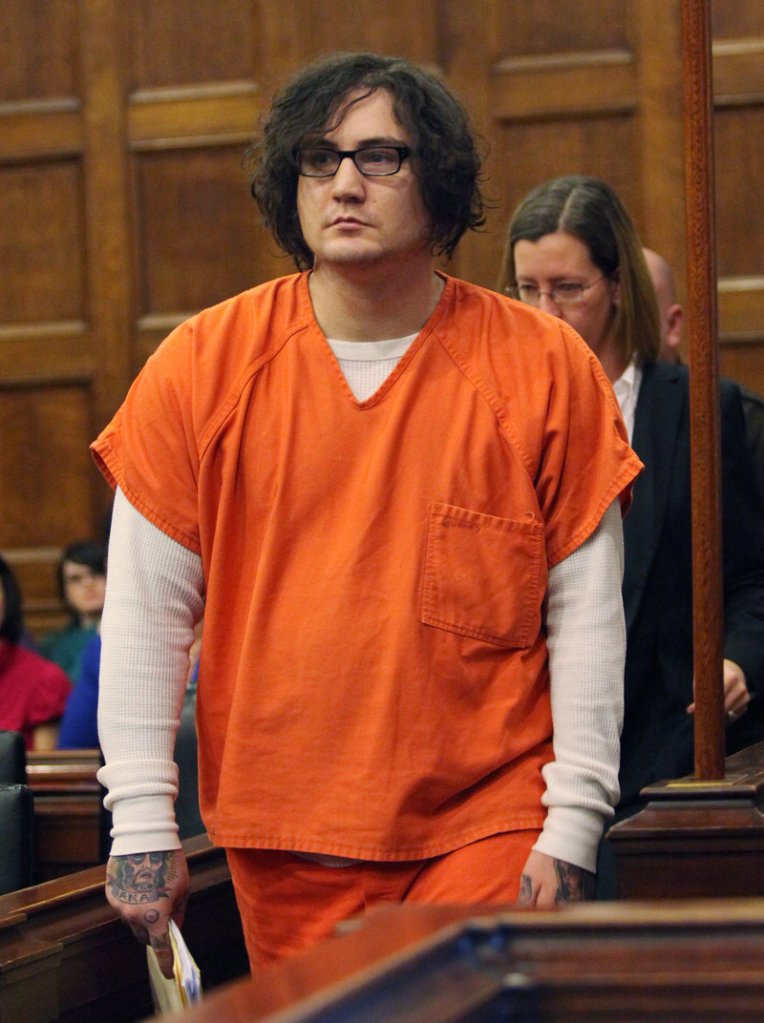PORTLAND – After two solid days of testimony focused on Chad Gurney’s mental health and his state of mind when he killed 18-year-old Zoe Sarnacki, the lawyers in his murder trial are expected to give their closing arguments this morning.
Then it will be up to Justice Roland Cole to determine whether Gurney was legally insane at the time, and whether he belongs in the state prison in Warren or the state psychiatric hospital in Augusta.
“I’ll try to get a decision soon” after closing arguments, Cole told both sides after Wednesday’s testimony.
The judge can take as long as he needs to reach a verdict. Gurney, 29, waived his right to a jury for his trial, which opened Jan. 10 in Cumberland County Superior Court.
Gurney declined to testify in his own defense.
Two psychologists and one psychiatrist, testifying for the prosecution Wednesday, were the final witnesses to take the stand. All three doctors were contracted by the State Forensic Service to examine Gurney in the months after his arrest for killing Sarnacki on May 25, 2009.
Psychologists Peter Donnelly and Andrew Wisch and psychiatrist Dan Filene all concluded that Gurney was deeply troubled and had a penchant to read meaning into his environment, sometimes believing he was guided by signs.
But all three told Cole that, in their opinions, Gurney understood what he was doing when he strangled Sarnacki, mutilated her body and set it on fire. The consensus among the doctors was that Gurney knew the wrongfulness of his actions.
Those opinions were in sharp contrast to the one given a day earlier by the defense’s expert witness, Dr. Harold Bursztajn of Harvard Medical School.
Bursztajn said Gurney experienced a psychotic break caused primarily by the lingering effects of a brain injury he suffered in a van crash in 2005. Gurney was delusional and felt he was supposed to kill Sarnacki as part of “a test” given to him by a spiritual guru he had met in Hawaii, Bursztajn said.
The doctor also said Gurney believed he was helping Sarnacki achieve eternal life.
Wisch, the psychologist, said Gurney had anger problems, strained relationships with his parents and a tendency toward “idiosyncratic thinking.”
Gurney had a higher-than-normal level of distorted thoughts, such as believing that a lyric or writing on a T-shirt was a sign telling him that he had to make a certain decision, Wisch said.
But unlike Bursztajn, Wisch said he did not believe that Gurney felt commanded by those signs, or that he slipped so far into delusion that he could not comprehend the consequences of his actions.
“I do not believe that Mr. Gurney was psychotic, that he was delusional … such that it would have compelled him or influenced him to kill someone,” Wisch said.
He said he reviewed police interviews with four of Gurney’s past girlfriends. Three of them said Gurney was physically and emotionally abusive, possessive and controlling. Two of them, Wisch said, reported that he was rough and liked to put his hands on their necks during sex.
If he is found guilty, Gurney will face a minimum of 25 years and a maximum of life in prison.
If Cole finds him not criminally responsible, Gurney will be committed to the Riverview Psychiatric Center in Augusta until he can prove to the court that he is no longer a threat to society.
Staff Writer Trevor Maxwell can be contacted at 791-6451 or at:
tmaxwell@pressherald.com
Copy the Story Link
Send questions/comments to the editors.



Success. Please wait for the page to reload. If the page does not reload within 5 seconds, please refresh the page.
Enter your email and password to access comments.
Hi, to comment on stories you must . This profile is in addition to your subscription and website login.
Already have a commenting profile? .
Invalid username/password.
Please check your email to confirm and complete your registration.
Only subscribers are eligible to post comments. Please subscribe or login first for digital access. Here’s why.
Use the form below to reset your password. When you've submitted your account email, we will send an email with a reset code.